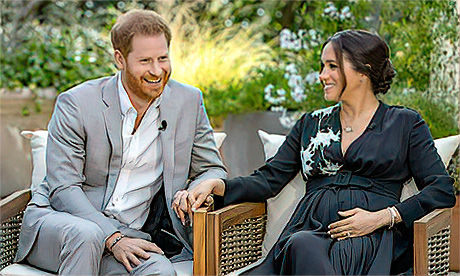There are two sharply divergent views about the Duchess of Sussex.
One is held by Piers Morgan, who has just left ITV’s Good Morning Britain breakfast programme in a huff. It is doubtless shared by millions of less voluble Britons.
According to Mr Morgan, Meghan’s contribution to the Oprah Winfrey interview was a ‘diatribe of bilge’.
He declared with characteristically colourful hyperbole that he ‘didn’t believe a word she says’ and ‘wouldn’t believe it if she read me a weather report’.
The opposing view — dominant on Twitter, favoured by the BBC, and supposedly held by most young people — is that Meghan is a victim of racism, and that all her allegations about the Royal Family must be unconditionally accepted.
Some who sign up to this set of beliefs go further.
They maintain that white people either have no right to doubt the Duchess’s testimony or, even more tendentiously, that anyone who does so must be racist.
Here are two examples.
In The Sun newspaper, a black journalist, Nana Acheampong, wrote: ‘If Meghan is telling you that she suffered racism in the Palace, then she did. Anyone who suggests otherwise is not black.’
Meanwhile, on the Thought For Today slot on Radio Four’s Today programme a young Anglican ordinand, Jayne Manfredi, also nailed her colours to Meghan’s mast.
She spoke of the ‘deeper malaise’ evinced by the ‘backlash’ against Meghan, who ‘had the audacity to tell her own truth’.
So there we have it.
Many of those who rally to Meghan’s cause do so because she is a youngish woman of mixed race, and therefore anything she says must be believed without qualification.
And those who question any part of her account (which, it must be said, was delivered with extraordinary aplomb) are written off as old, reactionary, mean-spirited and bigoted.
How did it come to this?
There have always been hotly contested differences of opinion – between Left and Right, Christians and atheists, pro-abortionists and anti-abortionists, and so on.
But people used often to arrive at these opposing views through the exercise of reason.
No longer.
Many uncritically believe Meghan’s very serious allegations against the Royal Family because of her background.
In their view, it’s not what she says that makes her right. It’s what she is.
I accept, of course, that we all see the world through the prism of our ethnicity, class and age.
But if we do no more than that — if we refuse to consider the facts as dispassionately as we are able to — we will end up with a fractious and divided society.
Despite what Jayne Manfredi says, truth is not something personal to us.
It’s not something we can own as individuals.
It’s an absolute, always hard to attain and sometimes even to recognise, but nonetheless the lodestar of any civilised community.
Despite what Jayne Manfredi says, truth is not something personal to us.
It’s not something we can own as individuals.
It’s an absolute, always hard to attain and sometimes even to recognise, but nonetheless the lodestar of any civilised community.
Let’s examine what the Duchess said.
I think Piers Morgan was wrong to dismiss her entire interview as ‘bilge’, not least because it suggests that her revelations about her suicidal thoughts can be swept aside.
He is saying she is either a fantasist or a liar — or both.
That’s rash. Continue reading
Additional readingNews category: Analysis and Comment.




